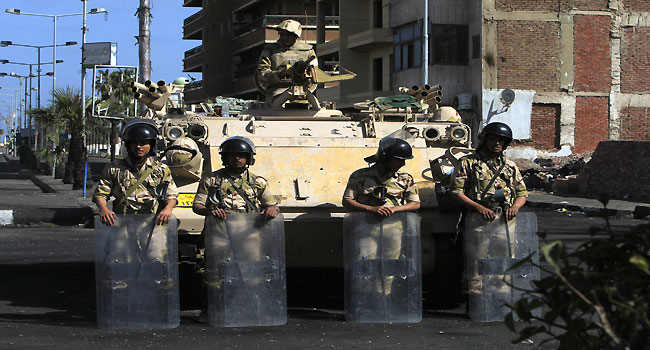
The military takes over security in Port Said city after the police’s withdrawal yesterday from Port Said city, 170 km (106 miles) northeast of Cairo, March 9, 2013. (REUTERS)
Cairo, Asharq Al-Awsat— Egypt’s Al-Gama’a Al-Islamiyya has begun to form “popular militias” to put an end to the security vacuum on the Egyptian street. In an official statement issued by the group, Al-Gama’a Al-Islamiyya pledged “not to stand idly by in the face of the senseless scenes on the [Egyptian] street.”
Senior Al-Gama’a Al-Islamiyya member, Assem Abdel-Magid, has been tasked with the job of forming these popular militias, and he has already issued a general call to the people of Cairo to join together and confront “thuggery”.
This new development comes in the wake of a controversial statement by Egypt’s Prosecutor-General which has been interpreted by some sections of society as urging the Egyptian people to take the law into their own hands.
The statement read: “Egypt’s prosecutor-general urges all citizens to exercise the right afforded them by Article 37 of Egypt’s Criminal Procedure Law issued in 1950 to arrest anyone found committing a crime and refer them to official [security] personnel.”
However a second statement, issued on the same day by the Prosecutor-General’s office, affirmed that “the statement by the Prosecutor-General did not include granting ‘judicial arrest’ powers to citizens, but rather granting these judicial arrest powers to officers as defined officially by the law.”
Egypt’s Prosecutor-General, Talat Abdullah, was appointed to this post in November 2012 following the removal of his predecessor Abdel-Meguid Mahmoud under controversial circumstances. In fact, Abdullah submitted a letter of resignation less than one month after he was appointed by President Musri after hundreds of public prosecutors staged a sit-in protest outside his office.
Abdullah’s statement calling on Egyptian citizens to exercise their right according to Article 37 of Egypt’s Criminal Procedure Law was issued just weeks after President Mursi, during a television interview, called for Egyptian citizens not to be “passive” and to “get involved” if they encounter criminals setting up illegal road-blocks and impeding traffic.
This is all taking place at a time when Egyptian police forces across the country have gone on strike. The protesting policeman are reportedly calling for better weapons and living conditions, as well as for the police force not to get involved in politics. Rioting was reported across Egypt following the strike, including in Cairo, Port Said, Alexandria, Mansoura, Mahala, and Assiut.
Alaa Abu El-Nasr, Secretary-General of the Building and Development party, the political wing of Al-Gama’a Al-Islamiyya, asserted that: “The decision of the Prosecutor-General to grant citizens the right to arrest vandals is a correct decision based on the law.”
He added, “The decision comes as a first step to confront systematic violence in Egypt.”
However the Freedom and Justice Party, the political wing of the Muslim Brotherhood, comprehensively rejected the idea of citizens’ arrests.
Hussein Ibrahim, Secretary-General of the Freedom and Justice Party, issued a statement on Monday affirming that the party believes that the role of the police cannot be carried out by any other institution or group.
He said: “The people should not help the police more than is clearly stated by the law.”
Al-Gama’a Al-Islamiyya has tasked Assem Abdel-Magid with the task of forming these “popular militias”. Abdel-Magid spent 15 years in prison on charges relating to the assassination of Egyptian president Anwar Sadat in 1981.
He called on the people of Cairo to form popular committees to protect the country’s infrastructure and confront “thuggery”. Abdel-Magid called on the people of Cairo to join together at their local mosques and form militias to protect public installations, particularly in the wake of the police strike.
Al-Gama’a Al-Islamiyya also announced that it would be establishing a militia to protect the Upper Egyptian city of Assiut if Egyptian police fail to return to work. Assiut has already been the scene of public riots, including protests against a decision banning bearded policemen from duty.
An official statement from the group asserted that “Al-Gama’a Al-Islamiyya will take over responsibility for the security of the city [Assiut] after hundreds of policemen went on strike and closed the police stations.”
Abdel-Magid also confirmed that Al-Gama’a Al-Islamiyya would secure all areas that had been abandoned by police, adding that the group is contemplating coordinating its actions with Egypt’s Interior Ministry.
He told the press, “Any policeman who wants to leave his position can do so. But he will not be allowed to come back” adding “we want to purge the ministry of such elements anyway.”
Egyptian Interior Minister Mohamed Ibrahim asserted that several groups are creating chaos in the streets with “unprecedented violent acts”. He acknowledged that the police forces are under strain, but insisted that he would not allow vigilante groups or militias to take over security duties.
He said, “From the minister to the youngest recruit in the force, we will not accept to have militias in Egypt” adding “That will be only when we are totally dead, finished.”
